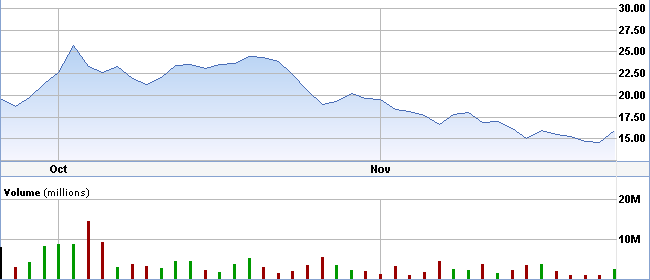汽车电池:现实和梦想
如果有人能够生产出一个个经济适用的,可充电的大容量汽车电池,这个世界将会是一个什么样的格局?
如果每个人都可以做到随便花点小钱,就能够在HomeDepot 或者Low’s 买到一个价廉物美的“小设备”,又很容易就可以安装在自家后院或者前面,既好看,又能够很充分地将终日来来去去的风神转变为电能,而这些电能又能够很容易地储层和使用,那么,这个世界又将会是什么样子的?
汽车电池技术的提高和普及,将在很大程度上改变这个世界的生活和人们的思考方式。那么,我们到底离这个梦想有多远呢?
前阵子,一家美国生产汽车用电池的公司(AONE)股票上市,开盘时人们似乎很兴奋。结果,一个季度下来,糟糕的业绩实在是再也无法提起投资者的兴趣了。看来,那些在初次上市时需要卖出股票的卖家,又一次成功地忽悠了股民一次。
今天,一家中国国营公司对于这一市场的参与,似乎是给了这个市场的玩家注入了一剂兴奋剂,只是,我担心,这种兴奋剂恐怕能够持续的时间不会太久。
巴菲特对比亚迪的兴趣,曾经给予不少的投资者以想象力飞翔的空间,巴菲特自己也因为中国股民对他的热爱而大赚特赚。
比亚迪的主打产品似乎就是电动汽车。那么,我不是特别能够理解,在汽车电池储层技术还没有怎么得到解决的前提下,电动汽车又能够兴旺到哪一步呢?
作为投资者,如果在中国或者香港地区投资,只要是时不时玩一家公司,巴菲特需要的实际上也就是一个故事和该故事所能够给大家带来的想象空间了。他的价值投资理念在那里只要是能够成为一个故事就好了、足够了。作为中国人心目中的神,这就是力量。
有时候觉得,中国股民似乎是一个被人玩弄的猴子,而且还是很听话的猴子。如果这代表了一种国民性,我看不出中国能够有让自己真正强大的一天。
你可千万别小看,投资者行为所折射的意义。
在金钱上,人们所表示出的行为非常真实,虽然很多时候这种真实可能还带着眼泪。如果在其他方面人们喜欢玩虚招的话,在这里所表现出来的非理性,就只能用愚昧来描述了。

AONE 在9月下旬上市之后的股价变化图
『汪翔(原创),作者保留所有权利,引用请注明出处,2009年11月24日』
下面是一个相关的新闻,附录在这里作为一份记录。
【附录】China's State Grid Enters Utility Storage Market
12:36 PM ET 11/24/09 | Dow Jones
By Jonathan Shieber
Of DOW JONES CLEAN TECHNOLOGY INSIGHT
SHANGHAI (Dow Jones)--China's State Grid Corp. said last week that it had developed its own sodium-sulfur battery for large-scale energy storage applications, marking the entry into that market of a major energy player.
Large-scale energy storage has recently become a focus for clean-technology investors, because large-capacity batteries can help smooth out the intermittent power supplied by renewable sources such as wind and solar.
With State Grid's debut in the market, start-ups and established players now have a very large, very experienced manufacturer with which they will potentially contend for business in a field full of early-stage technologies.
"Energy Storage is becoming more important and it is very exciting to see State Grid really driving it," said Yong Zhang, a clean-technology practice partner with Qiming Weichuang Venture Capital Management (Shanghai) Co. "They may give different technology [and] solutions a share in their first batch of trials."
State Grid didn't respond to a request for comment about its battery storage work.
One investor with knowledge of the battery industry said that there's no certainty that the state-owned enterprise can develop this technology to the point of manufacturing it on a commercial scale. He described the company's efforts as more like a research and development project.
He said that several companies with large-scale storage technologies are working in partnership with State Grid on bringing the technology to the market.
In addition to its reputation as one of China's two grid-management companies in charge of overseeing the distribution of power for most of the country's population, State Grid is also China's largest manufacturer of electrical equipment, which means it has an established manufacturing base.
Currently, the premier manufacturer of sodium-sulfur batteries is the Japanese company NGK Insulators Ltd. (5333.TO), which is currently selling its batteries for pilot projects with a number of utilities worldwide. For example, Columbus, Ohio-based American Electric Power Co. (AEP) has been using a sodium-sulfur battery from NGK Insulators at a site in Charleston, W.Va., to determine the capabilities of the technology.
But a number of other companies are looking to unseat it with new technologies. For instance, Fairfield, Conn.-based General Electric Co. (GE) invested approximately $100 million to build a battery research facility in Niskayuna, N.Y., that will conduct research into sodium-sulfur batteries.
Venture investors have also stepped into the breach - with a trio of some of the biggest and most active firms in the U.S. staking money on battery plays in North America and China. Draper Fisher Jurvetson has backed the China-based Prudent Energy Inc., while Intel Capital has put its money behind the Chinese power company NetPowerTech Co.; VantagePoint Venture Partners has invested in the large-format North American battery manufacturing company Premium Power Corp.
These companies all have different technologies, but for all of them their target market is the utility sector. And with the money China is spending on building out its infrastructure, it could make a tempting place to try and plant a flag for a fledgling business.
Other technology developers, such as publicly traded, Watertown, Mass.-based A123 Systems Inc. (AONE) and Shenzhen, China-based BYD Co. (1211.HK) think that the utility market represents another opportunity for their lithium-ion battery technology, which has traditionally been seen as a more suited energy storage technology for the automotive industry.
The U.S.-based think-tank the Electric Power Research Institute has proposed that utility markets could complement the work that companies like A123 Systems have done in the transportation sector, using lithium-ion batteries.
Lithium-ion battery manufacturer Valence Technology Inc. (VLNC) is working with two European power and transmission companies, National Grid PLC (NGG, NG.LN) and Red Electrica de Espana, to develop large-scale batteries for utility grids, Clean Technology Insight reported previously.
However, some utility executives aren't convinced that battery technology will provide viable storage. Fong Wan, senior vice-president of energy procurement at San Francisco-based utility Pacific Gas & Electric Co., speaking at the Dow Jones Alternative Energy Innovations conference held last week in Redwood City, Calif., said he hadn't "seen any successful battery technology on the wholesale level." PG&E, he said, is investigating adding more pumped storage technology and looking into using compressed air for storage.
Even though State Grid is the biggest game in China when it comes to the power market, industry observers said that competition from the company doesn't mean that China is necessarily closed to other vendors.
"Chinese companies will take the best technology out there," said Jonathan R. Woetzel, a director in the Shanghai office of consulting company McKinsey & Co.
(Dow Jones Clean Technology Insight covers news about public and private clean-technology and alternative-energy companies.)
By Jonathan Shieber, Dow Jones Clean Technology Insight; 8621-6120-1200; jonathan.shieber@dowjones.com






